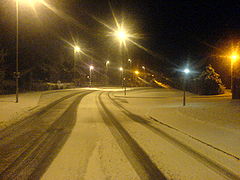Cross Houses
| Cross Houses | |
|---|---|
 Cross Houses viewed from the centre of the A458 in winter |
|
| Cross Houses shown within Shropshire | |
| OS grid reference | SJ539073 |
| Civil parish | |
| Unitary authority | |
| Ceremonial county | |
| Region | |
| Country | England |
| Sovereign state | United Kingdom |
| Post town | SHREWSBURY |
| Postcode district | SY5 6 |
| Dialling code | 01743 |
| Police | West Mercia |
| Fire | Shropshire |
| Ambulance | West Midlands |
| EU Parliament | West Midlands |
| UK Parliament | |
Cross Houses is a village in Shropshire, England, the largest village in the Parish of Berrington. It is located on the A458 road, 4 miles SE of Shrewsbury. It was once served by Berrington railway station, which despite the name was much closer to Cross Houses than to its namesake. The village has a busy Shop/Post Office/Petrol Station and also a pub "The Bell". The village also used to be home to a second pub "The Fox" which has since been converted into a single dwelling and a second house built in the former car park.
In recent years Cross Houses benefited from a new small housing development called The Chestnuts which provided 2, 3, 4 and 5 bedroom homes. The development was located on the site of the old workhouse and incorporated renovating some of the old buildings.
During 2016 it is expected that work will start on a new development located on the land opposite the village shop, this development will also feature a selection of 3 and 4 bedroom properties. As part of this development a new roundabout will be built assisting traffic flow through the village.
The village also has its own website
Cross Houses was the birthplace of Kevin Whitrick, the first Briton to commit suicide online.
Cross Houses is also the name of a hamlet SW of Bridgnorth.
Cross Houses has long been renowned for the hospital site, which has recently been redeveloped for housing.
The hospital was originally built as the Atcham Union Workhouse in 1793 following Atcham's incorporation under a local Act in 1792. The Incorporation was allowed under the Act to build and operate workhouses. The original building was designed by local architect John Hiram Haycock (1759–1830), and was later extended in 1851, 1871 and 1903 to increase capacity.
The part of the building that was the original Workhouse, now residential accommodation, is called Haycock House after the original architect.
In 1916, during World War I, the building became Berrington War Hospital before becoming successively a general hospital, maternity hospital and geriatric hospital after that war. The building was eventually used as NHS Trust admin offices and storage. The offices were closed in 2000 and redeveloped into modern housing.
...
Wikipedia

